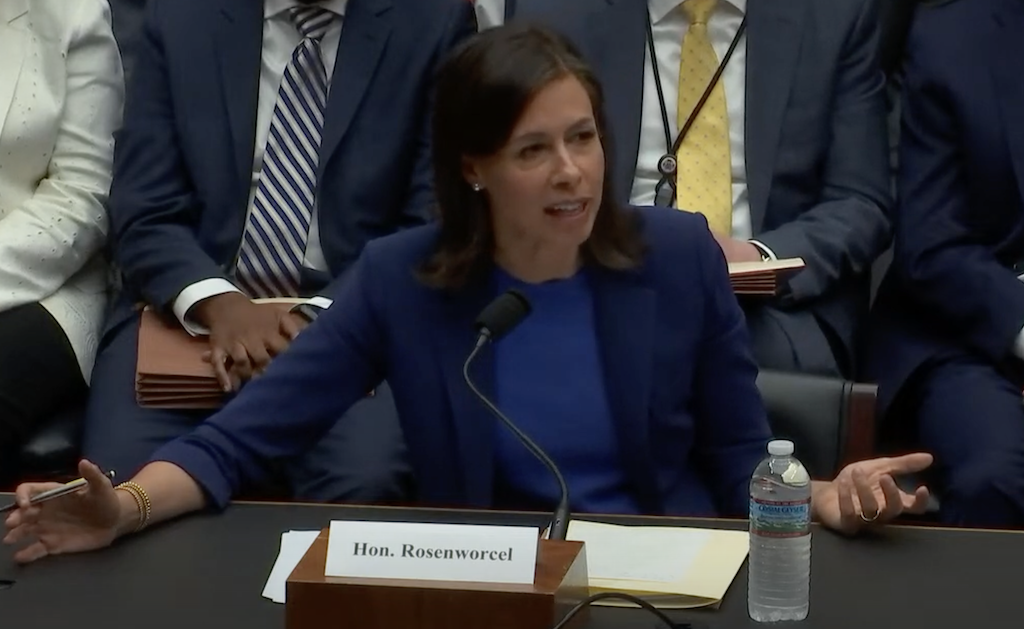Rosenworcel Defends FCC Policies at Budget Hearing
GOP lawmakers and commissioners aired grievances with several agency actions.
Jake Neenan

WASHINGTON, July 9, 2024 – A House hearing Tuesday on the Federal Communications Commission’s budget was mostly occupied by partisan policy disputes.
The agency is asking Congress for $448 million, up more than 14 percent from its FY2024 budget, which Republican Commissioner Brendan Carr said he opposed, calling an increase of that size “out of line with agency precedent” in his opening statement.
The House Appropriations Committee approved a $416 million budget for the agency last month, a smaller increase of more than 6 percent.
Carr joined GOP Commerce Committee members in taking swipes at policies instituted by the agency’s 3-2 Democratic majority, including the reinstatement of net neutrality and new digital discrimination rules.
Net neutrality
On the net neutrality front, FCC Chairwoman Jessica Rosenworcel, while reiterating her opposition to broadband rate regulation, did not say outright whether a New York law mandating certain broadband rates for low-income households would be preempted by the agency’s Title II order.
“There is no petition before us, but we did say in our order that state broadband affordability efforts do not per se violate our rules,” she said. “We will look at any individual case if a petition is filed before us, and one is not before us right now.”
The FCC net neutrality order overrode conflicting state regulations over broadband, which, since the order forbore from Communications Act provisions allowing for rate regulation, could spell trouble for the New York law.
Efforts to ensure affordability by setting price caps for low-income consumers generally have Democratic support, and the commission added to its order language stating “the mere existence of a state affordability program is not rate regulation” and declining to address any specific state program.
As he has said before, Carr called for the agency to strike down the law.
“The substance of the New York law is naked rate regulation,” he said, “and we should step up and be clear that we don't support rate regulation, and that that provision of New York law is preempted by operation of the agency's Title II decision.”
ISPs had sued to block the law, but judges ruled before the Title II order that New York could regulate broadband prices as it saw fit.
Wi-Fi hotspots
Rosenworcel and Carr also continued to butt heads on her proposal to expand the FCC’s E-Rate program to cover Wi-Fi hotspots for off-campus use.
E-Rate, part of the agency’s Universal Service Fund, subsidizes internet for schools and libraries at $2.4 billion a year. Rosenworcel released a proposal to expand the funding to hotspots that could be loaned for students to take home.
“You probably remember from the pandemic, kids and people sitting in parking lots and outside of schools just trying to get online. This is an effort to help stop problems like that,” Rosenworcel said. “We have authority under the law to make it happen. Every library in this country should have wireless hotspots for loan.” She is planning a vote at the FCC’s July 18 meeting.
The commission’s two Republicans and GOP lawmakers have opposed the plan, saying the Communications Act limits E-Rate to the physical premises of schools and libraries. An FCC order adopted in October that extended E-Rate funding to Wi-Fi on school buses faced similar opposition and is under review by the U.S. Court of Appeals for the Fifth Circuit.
Carr called the hotspot proposal “unlawful,” saying the agency needs to “stick with the statutory terms” for E-Rate.
Bulk billing
Rosenworcel also defended her proposal to open up a comment period on banning bulk billing agreements between landlords and broadband providers, which has received some pushback since its announcement in March.
Such agreements typically involve property owners and providers negotiating terms for bulk service to a building’s tenants, who are then billed for their share of the cost. Rosenworcel has said these deals skirt the agency’s ban on exclusive revenue sharing agreements and lock tenants into contracts with certain ISPs when competitors are available. Providers argue bulk billing arrangements let them provide service that’s cheaper than individual plans.
Rep. Gus Bilirakis, R-FL, told Rosenworcel he worried the move would increase prices for retirement communities in his district
“What we proposed is a rulemaking to ask those questions, mindful that there are some constituents, including folks like the ones you described, who might like these services. But it’s been 14 years since we looked at this issue, and 14 years in broadband is a long time,” she said in response. “We want everyone to have the benefit of competition, so opening this issue up for public comment I think is the right thing to do.”









Member discussion